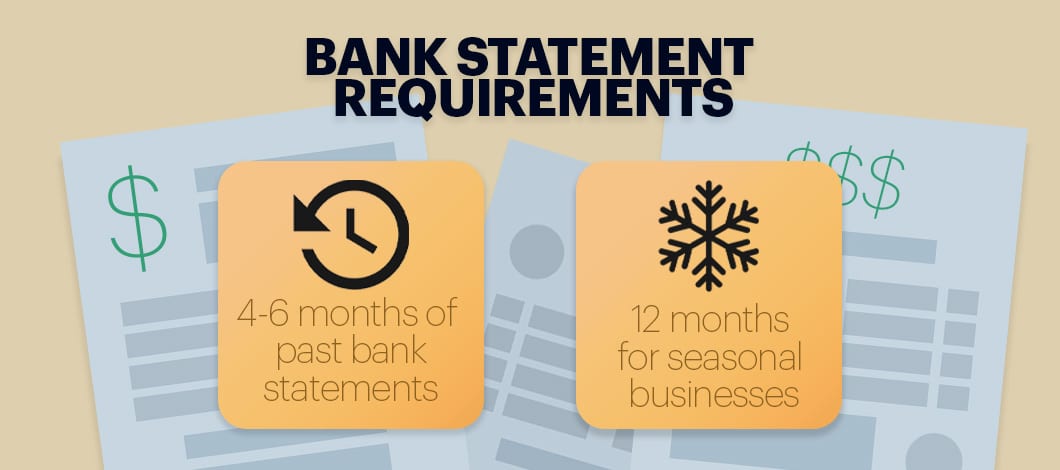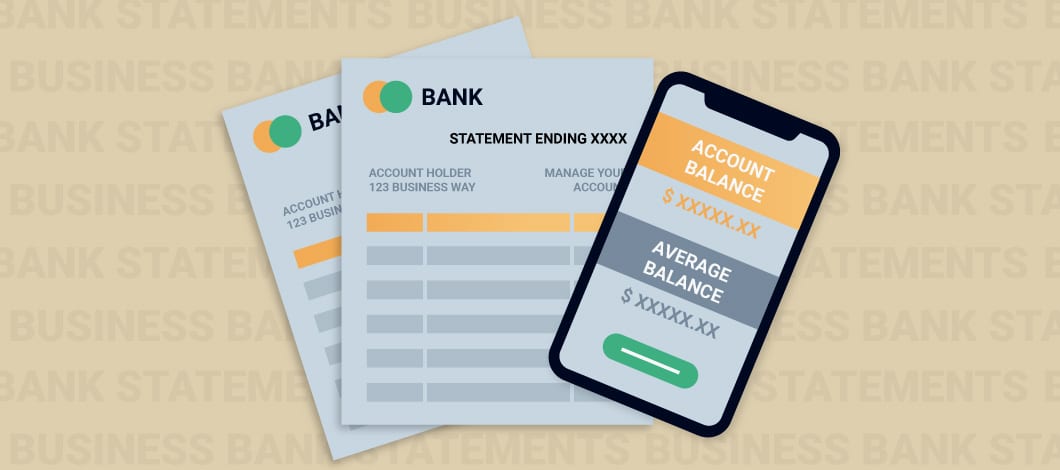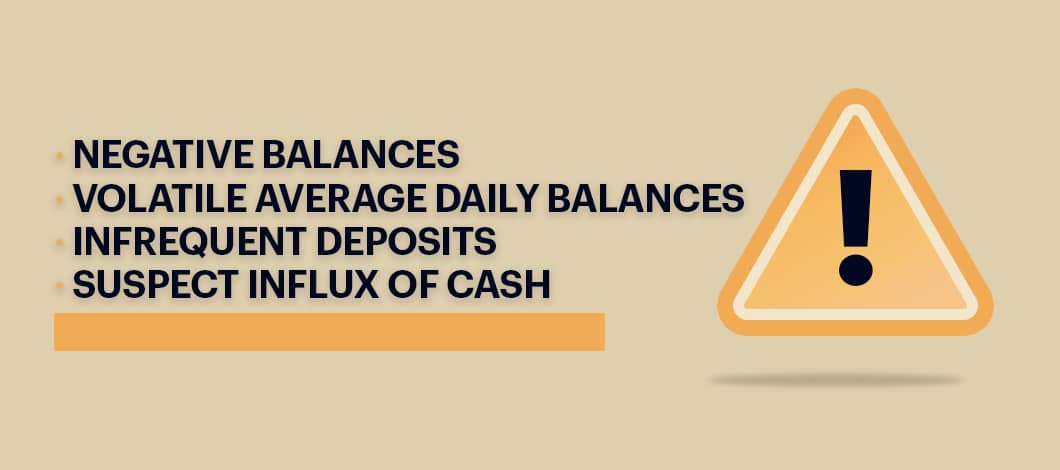Believe it or not, lenders do verify bank statements when they’re evaluating applicants for financing in order to get insight into the borrower’s inflow and outflow of capital.
If you’re applying for a business loan, they’ll ask to see your business bank statements to better understand how your company is managing its finances. After all, your bank statements provide an overall view of your income and expenses and help lenders determine if you’re a strong candidate for funding (or not).
Let’s go into more detail about why lenders need bank statements when evaluating business loan applications, including how bank statements impact your ability to access financing.
What Are Bank Statement Business Loans?
With bank statement business loans, lenders will review several months of your company’s banking documents to get an idea of your average daily balance, cash flow and revenue.
If you were applying for a personal loan, a lender would request W-2 forms or pay stubs to prove you had a steady source of income. As a small business owner, you don’t have a W-2, so your business bank statement is a key document. It gives lenders insight into whether you can repay the loan you’re requesting and alerts loan providers to potential lending risks.
What Do Underwriters Look for in Bank Statements?
Lenders review bank statements to see if you meet their qualification requirements to obtain a loan and if you can afford the loan payments.
A low or negative account balance, for example, warns lenders that an applicant might be unable to handle repayments. Bank statements will also show recurring payments you’re making and any deposits made by another funding company. Depending on how these financing amounts affect your statement totals, lenders might realize your business can’t meet the minimum balance requirement on its own.
Insufficient Funds
When it comes to business loans based on bank statements, your average daily balance says a lot about the way your business functions and it shows lenders if you’ll be able to repay their loan to you. If a company’s bank statements indicate a struggle to keep a positive daily balance, getting approved for financing may prove difficult.
That isn’t to say that 1 or 2 incidents will diminish your chances of finding a lender.
That said, keeping your account balance positive and minimizing your amount of insufficient funds and overdrafts will help increase your chances of approval.
Deposits
Here’s another thing lenders asking for bank statements want to see: frequent deposits to your account. If your business is receiving multiple deposits a day, your business is likely viable.
However, if you haven’t received a deposit in weeks, lenders might shy away from financing your business. A lack of daily deposits can result from a handful of things, none of which are particularly promising for your business’s chances of being approved.
On the other hand, if you have sudden, large bank deposits, lenders might question those. They want to be sure you’re not trying to beef up the funds in your account just to qualify for a loan, such as by borrowing money from another source. They’ll also need to know about all your outstanding loans and debt payments, as this will affect your debt-to-income ratio and how much of a loan you can afford.
Recurring Withdrawals
Lenders will also scan your bank statements for any recurring withdrawals. This indicates your expense history and confirms if your business is already repaying a debt owed to another lender.
Some lenders will shy away from being what’s referred to as a “second position” lender because there’s an increased risk of loss. Legally, if a business defaults, the second lender must wait for the original lender to be repaid before they begin seeing compensation for their loss.
If your business is repaying pre-existing debt, it doesn’t mean you have no chance at being approved — but your lender will want to know of any remaining balances your company may have.
Cash Reserves
Lenders of business loans based on bank statements may look more favorably on companies that have a cushion of funds. This means you have a backup to draw from to make your loan payments if you encounter a slow month or two. It also shows you have a handle on your finances.

Bank Statement Loan Requirements
Whether you’re applying for a merchant cash advance with an alternative lender or a small business line of credit with a bank, you’ll likely need to provide at least 4-6 months of bank statements (or the last year’s worth if your business is seasonal). The number of required bank statements varies by lender and loan type. Check your lender’s specific requirements when you’re ready to apply.
In addition, lenders evaluating you for a business loan based on bank statements may want to see the following documents:
- Driver’s license
- Voided business check
- Proof of ownership
- Business license
- Tax returns
- Records of liquid assets or investments
How Do Lenders Verify Bank Statements?
When lenders do verify your bank statements, they may want your financial institution to confirm your business bank account details with verification (or proof) of deposit. The request and fulfillment requirements vary from lender to lender.
Sometimes a lender can directly confirm details electronically (e.g., Plaid software helps lenders authenticate customers’ account information). However, other lenders might want you, the borrower, to obtain physical documents, including a letter on your financial institution’s letterhead.
Verified information can include the following:
- Account number and type
- Balance
- Names on the account and any authorized signers
- Account open and close dates
- Audit trail of your business bank account’s deposits and expenses
Can You Get a Business Loan Without a Business Bank Account?
Not likely. Of business owners who didn’t have business bank accounts, 70% were denied a loan.
You’ll also be hard-pressed to find business loans without bank statement requirements in general. (While you could get a personal loan without a bank account, such as a title loan, the terms are less favorable, and the APR will be much higher than a business loan.)
If you’re searching for a business loan without a business bank account, consider opening one. In some cases, bank account applications can be completed online.
With a company bank account, you can start building a more transparent financial picture, which lenders will want to see when they’re evaluating you for loan approval. Additionally, a business bank account is a good way to keep personal and business expenses separate.
Business Bank Statement Loans: The Bigger Picture
At the end of day, all the bank statements lenders review should indicate that your business is healthy and consistent.
While the definition of a “healthy business” varies from lender to lender, if your business is making enough to operate comfortably while paying expenses, employees and debt, then chances are, you’ll be considered a good candidate by lenders.
Although minimum time in business requirements vary by lender, you’ve demonstrated your consistency if your business has shown the ability to turn a profit. This is incredibly important for lenders to see because they want to ensure your business is sustainable before extending capital to your company.
Don’t be afraid to share your company’s bank statements with your lenders, even if you’re worried they aren’t impressive.












